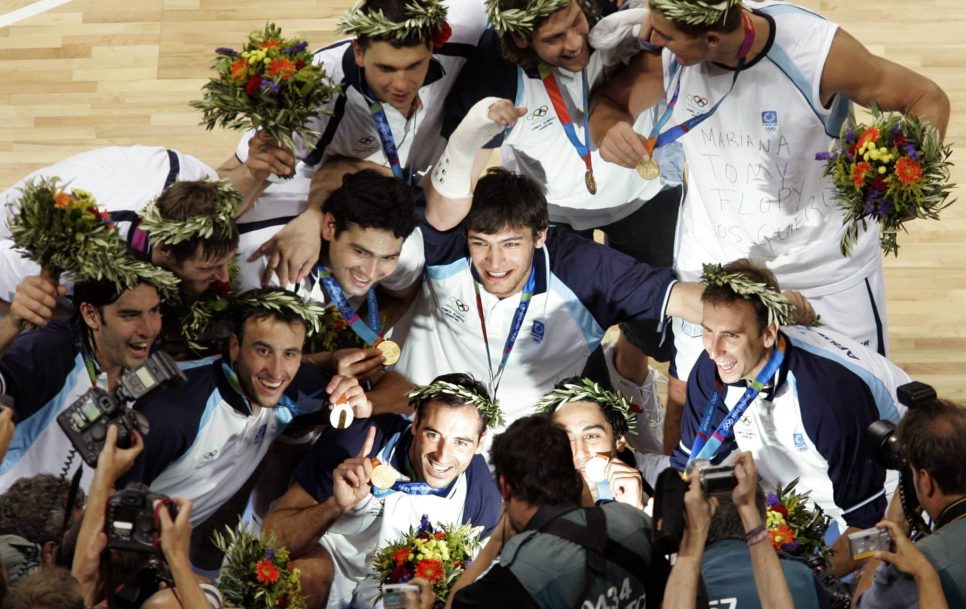Olympic icons: Argentina’s basketball golden generation
Argentina, a country that has always loved sports, has won plenty of silverware across different sports. Beyond the World Cup titles in football, the most remarkable achievement for the South American nation is the 2004 Olympic gold in basketball, which required overcoming the star-studded USA team.
To reach the Athens Olympics, Argentina had to finish in the top three at the 2003 FIBA Americas Championship (AmeriCup). Despite an unexpected loss to Mexico in their opening game, they accomplished this by winning the silver medal, having defeated Canada, led by Steve Nash, in the semifinals before losing 73-106 to the USA.
It’s interesting to note that, unlike today, where the participation of American stars in the World Cup or even the Olympics is uncertain, let alone in smaller international tournaments, several stars such as Tim Duncan, Ray Allen, and Tracy McGrady were part of the team that faced Argentina.
The stars aligned
Coach Rubén Magnano, who took over the Argentine team in 2001, managed the golden generation of the country’s basketball team. They were a threat on paper and on the court, winning medals in four consecutive years under Magnano’s guidance.
Notably, Magnano, who had always loved basketball, was a physical education teacher before dedicating himself to coaching. In the early 1990s, he began winning titles at the club level in Argentina, catching the attention of the national federation. He served as an assistant coach for the men’s national team and the head coach of the U21 team before being promoted to replace Julio César Lamas as the head coach of the senior national team.
Magnano’s debut tournament, the 2001 AmeriCup, ended with a gold medal. The 2002 World Cup in the USA was even more significant. Argentina defeated the hosts — the first loss for a USA team composed entirely of NBA players — and reached the final, ultimately losing to Yugoslavia.
By the time of the Athens Olympics, all the stars had aligned. Argentina had a well-coordinated team that knew exactly what their coach demanded. It’s also worth noting that a critical factor in the national team’s success was the players’ transition to strong European leagues, mainly in Spain.
Argentina had strong players in the backcourt, forward positions, and paint. Team leader Manu Ginobili had become a solid player in the NBA after conquering Europe; Luis Scola and Andres Nocioni had risen to stardom in the EuroLeague with Baskonia; Fabricio Oberto was a champion in the Spanish league and a well-regarded center.
The group stage in Athens went quite predictably. Argentina won three out of five games, lost to Spain due to a poor final quarter, and fell to Italy by just one point. They had the chance for a rematch five days later, but we’ll get to that shortly.
However, in hindsight, Argentina’s downfall was not far off. For instance, they narrowly defeated Serbia and Montenegro thanks to a last-second basket by Ginobili and overcame New Zealand by just four points.
Another win against the USA
In the quarterfinals, Argentina faced host Greece. Despite the home crowd’s fervent support and Greece winning the second quarter 21-7 to take a six-point lead into halftime, Magnano’s players were far from being knocked out. Led by Ginobili and Oberto, they turned the game around in the second half, winning 69-64 and setting up a semifinal against the USA.
Although the American team in Athens was less formidable than this year’s roster in Paris, with stars like Duncan and Allen Iverson and young talents like LeBron James, Dwyane Wade, and Carmelo Anthony, they were still favorites against Argentina. This was even though they had already lost to Puerto Rico and Lithuania in the 2004 Olympics.
However, while the American performance tended to be individualistic, Argentina shone with its teamwork. With Ginobili scoring 29 points, Argentina entered the final ten minutes with a 13-point lead. The USA tried to come back, but they couldn’t avoid an 81-89 defeat.
After the victory, Ginobili noted that the rest of the world was catching up to the USA. He added, “They had great players, but also many young ones who hadn’t played at the international level and with FIBA rules.”
The final against Italy was anything but easy. Although Argentina controlled the game, the Italians closed within two points nine minutes before the end, thanks to five consecutive points from Massimo Bulleri.
Argentina responded with a decisive run: Alejandro Montecchia’s two three-pointers and four points from Scola put the game out of reach for Italy. The final score was 84-69, securing an unforgettable Olympic gold.
It’s also significant that the golden generation’s major achievements in Argentine basketball came when the country was in crisis. First, they were hit by an economic downturn around the turn of the century, and in the year of the Athens Olympics, they faced an energy crisis.
The national team understood in the early 2000s that success on the court wouldn’t boost the country’s economy but might offer rare moments of joy during tough times. “Maybe this victory will help people feel better,” noted assistant coach Fernando Duro after Argentina defeated Dirk Nowitzki’s Germany in the 2002 World Cup semifinal.







